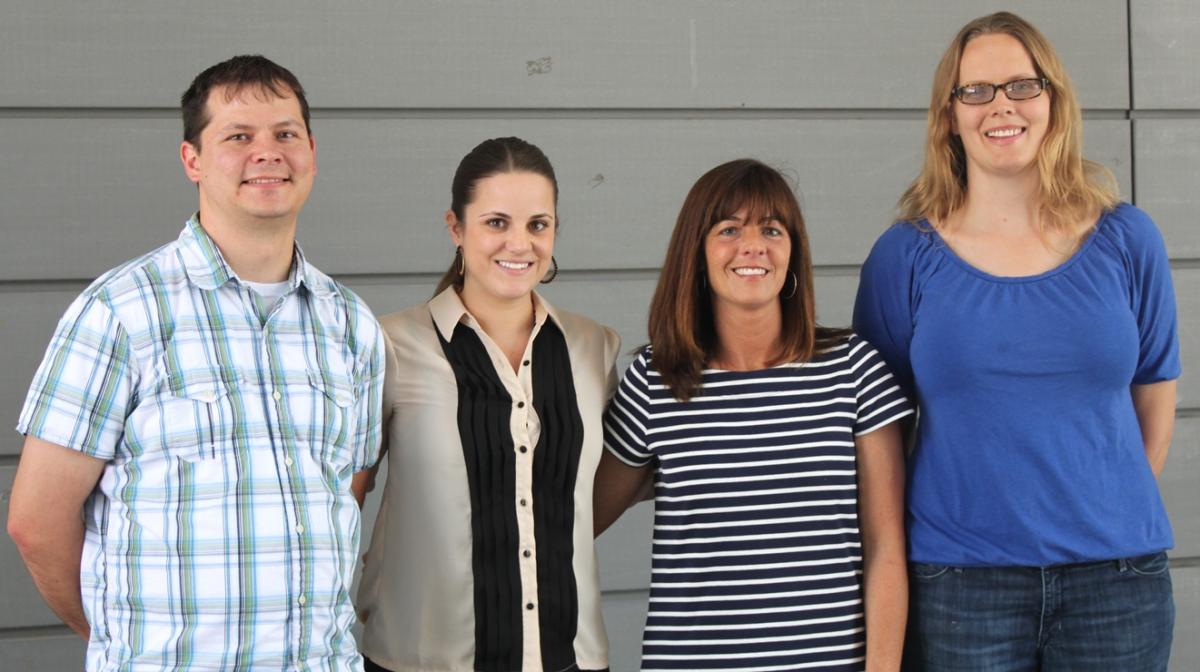Public Health Researchers Receive 2013 Hot Shot Award For Arizona Vaccine Exemption Study
 |
| Vaccine research team from the UA Mel & Enid Zuckerman College of Public Health. (L to R) Steve Haenchen, Heidi Pottinger, Elizabeth Jacobs, Kacey Ernst, and Michael Birnbaum (not shown in picture). |
A team of faculty and graduate students from the Mel and Enid Zuckerman College of Public Health at the University of Arizona received a 2013 Hot Shot Award from The Arizona Partnership for Immunization, also known as TAPI. The team was awarded for research that identified Arizona schools with high rates of personal belief exemptions (PBE) among kindergartners. The first part of their research was published in the journal Vaccine (January 2013).
The Hot Shot award recognizes individuals and organizations who have distinguished themselves by improving the health and wellness of Arizona’s communities and the lives of children through increasing immunization rates.
“TAPI has been working for 20 years to address vaccine preventable disease issues in Arizona,” said Kacey Ernst, PhD, assistant professor of Epidemiology at the UA Zuckerman College of Public Health. “The recognition for our efforts to understand vaccine refusal means that we have the support of TAPI, a key community partner. It’s very exciting because we know it will require multiple partners to improve vaccine uptake.”
Michael Birnbaum, MPH (Class of 2012), was the lead author of the study. He conducted the data analysis using data from the Arizona Department of Health Services (ADHS). The research was part of his dissertation in the Master of Public Health in Epidemiology program. Birnbaum is currently a Programmer in the Infectious Diseases Division at Washington University School of Medicine in St. Louis.
As a result of the study, the ADHS awarded the UA College of Public Health a $65,000 contract to conduct more in depth studies to determine why people choose not to vaccinate.
Graduate students Steven Haenchen (PhD/Epidemiology) and Heidi Pottinger (MPH/Global Family & Child Health) were recruited to conduct research among Arizona physicians and parents to better understand why people choose not to vaccinate.
Haenchen surveyed 152 physicians from diverse geographic and clinic types across the state of Arizona. “Our goal was to examine how frequently they were requested by parents to skip or delay vaccinations, how comfortable they were with allowing parents to exempt, how they treat those patients, and if they would support a policy change that would require their approval for vaccine exemptions before school entry.”
“We found that Arizona providers are generally very supportive of vaccination but they were more comfortable with parents exempting from vaccinations for diseases commonly associated with adulthood.”
Haenchen said a small proportion of physicians refuse to provide regular care to children whose parents choose not to vaccinate. In this study, the majority (63%) of health care providers are not supportive of a change in protocol requiring a physician’s approval. The reasons for their hesitation have to do with a concern that this change in policy would not reduce vaccine exemptions and that requiring physician approval would increase the burden on their practice.
Pottinger looked at parental attitudes towards immunization in Arizona and received more than 400 survey responses from parents residing in Maricopa and Yavapai counties. “We also conducted town-hall meetings at some of the schools to gain a better understanding of what parent's concerns were with respect to vaccines and vaccination exemptions.”
Both Haenchen and Pottinger plan to submit their research for publication.
“I can’t overstate the contribution of our graduate students to this research project. Michael, Steve and Heidi are the engines that drove this research,” said Jacobs.
Ernst said the research team will continue to explore the public concerns over the safety and efficacy of vaccines. “Now that we have a better understanding of why parents are refusing vaccines we can set out to develop refined educational programs that clearly demonstrate the science.”
The Hot Shot award was presented to the College of Public Health research team at TAPI’s annual Big Shots of Arizona ceremony on April 17, 2013 at the Phoenix Country Club.

